Newsletter


Our Newsletter
Connections
Sep
1

Growing During the High Holy Days
With the High Holy Days coming soon, Jewish Home e-Connections sat down with Rabbi Karen Bender, director of spiritual life for the Los Angeles Jewish Home, to discuss a central theme of the holidays: growth and change.
One of my favorite Jewish stories is attributed to the Chafetz Chaim, an influential Eastern European rabbi, 1839-1933. When asked how he had such an impact as a great sage and leader in the 20th century Jewish world, the Chafetz Chaim answered, “I set out to change the world but I failed. So I decided to scale back my efforts and only try to influence the Jewish community of Poland, but I failed there too. So I targeted the community in my home town of Radin, but achieved no greater success. Then I gave all of my effort to changing my own family, and failed at that as well. Finally, I decided to change myself, and that’s how I had such an impact on the Jewish world.”
The High Holy Days are about changing ourselves.
As 21st century American Jews, we tend to focus our efforts upon repairing what is wrong around us. Some are active on issues of social justice. This year some are active in the elections. Some are active in helping the Jewish community, including the Los Angeles Jewish Home. And, of course, this is so important as it constitutes Tikkun Olam, world repair. I, myself, hope to look back on my own life as a citizen of Los Angeles, an American citizen and as a Jew someday and be able to proudly say I made a difference in important causes and institutions.
We also need to heal and change our souls. The ten day period between Rosh Hashana and Yom Kippur is the ideal time to jump start that practice. During the High Holy Days we call it “Tshuva,” or “Repentance,” but I prefer to call it, “growing.” This work is never done. It is a lifelong process and opportunity. And for our residents this is extremely important. While most of them are past the point of truly being able to be activists with their time or resources, they can always improve as human beings and they do. They are my inspiration.
As Alan Morinis recounts in his book, Everyday Holiness, Rabbi Yerucham Levovitz guides his students along these lines in the following way. One beautiful Spring day, when a group of boys gathered in his house to study, the rabbi rushed into the room and had a very agitated look on his face. He cried out, “I just came from the street and I saw that all around me everything was growing. Why are you not growing!?”
Change is possible. Growth is imperative. You are like a garden.
Shana Tova!
Aug
1
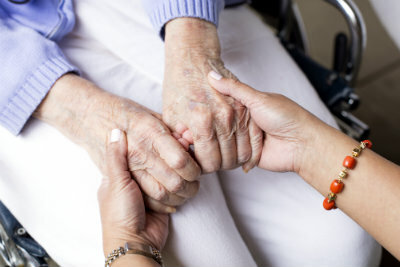
Palliative Medicine: Providing Comfort Care
Palliative care is specialized medical care for people with serious or life-limiting illness. It is both a philosophy of care and a process for delivering care, and focuses on providing relief from the symptoms and stress of illness and improved quality of life for the patient and their family. The primary objective is comfort for the individual or patient while they receive treatment consistent with their personal goals of care. Goals for care is the structure to which an individual’s palliative care plan is devised and thus very important.
What exactly is palliative care, or palliative medicine? How did it come to be? Who can benefit from it?
“Palliative” means to relieve or lessen without curing. Palliative medicine is often thought of as only a part of hospice care provided to someone who has been diagnosed with a fatal disease or illness. While palliative medicine is a crucial component and indeed grew out of hospice care, palliative medicine is a much broader specialty and can treat patients in various trajectories of their illness including alongside curative treatment. In 2006, palliative medicine became a board certified sub-specialty of internal medicine with specialized fellowships for physicians who are interested in the field. Today, palliative care may be provided in a hospital, cancer center, nursing home, outpatient clinic, hospices, or in the patient’s home.
Focusing on the symptoms of both the disease and the treatment, palliative care helps with a wide range of issues. These may include pain, depression, anxiety, fatigue, shortness of breath, constipation, nausea, loss of appetite, and difficulty sleeping. It also helps an individual to gain the strength to carry on with daily life and can help improve the ability to tolerate medical treatments. Palliative care also gives an individual more control over their care by improving their understanding of treatment options.
Palliative care is provided by a multi-disciplinary team made up of physicians, nurses, social workers, and other healthcare professionals who work together with an individual’s primary care physician and specialists. Treatment plans can include medication, massage therapy or relaxation techniques. Since palliative care treats the entire person, team members address social, psychological, emotional or spiritual needs the individual may have.
Anyone who is experiencing uncontrolled symptoms related to surgery or illness may benefit from palliative care. These illnesses include multiple sclerosis, cancer, congestive heart failure, kidney illness, stroke, ALS (Lou Gehrig’s disease), emphysema or COPD, and Alzheimer’s disease and dementia. If there is a sudden change in health due to heart attack, stroke, hip or spinal fracture, or a subtle onset, such as weight loss, pain, recurring infections, fatigue, avoiding food or medications, a palliative medicine consultation should be considered.
The Jewish Home Center for Palliative Medicine strives to provide comfort care to benefit the individual and support for their family. The team is led by Medical Director David Wallenstein, MD, who is board certified in Hospice and Palliative Medicine, and is the lead member of the Palliative Medicine Service at UCLA Medical Center. Dr. Wallenstein is also an Associate Professor at the UCLA David Geffen School of Medicine. Anne Moore, MSN, FNP-c, serves as the Center’s palliative service program manager. She is a board certified Family Nurse Practitioner, ELNEC trained and has over 30 years of experience in geriatrics and palliative medicine.
Palliative medicine services are covered under Medicare Part B, Medi-Cal, and most private insurance companies.
For more information about palliative medicine and the Jewish Home Center for Palliative Medicine, please call (818) 578-7427 or visit us online at www.skirballhospice.org/services/palliative-care.
Aug
1
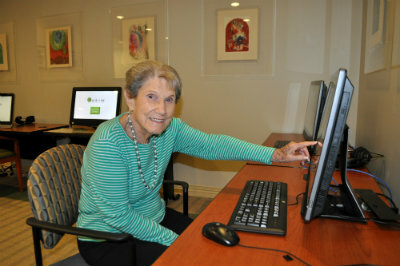
A Reading Refuge and Computer Center for Residents at Grancell Village
Located on the first floor of the Joyce Eisenberg Keefer-Medical Center (JEKMC), the Maxine Dunitz Family Learning Center is a place where residents are able to go to read books, use computers to play games or check email, and challenge their minds with cognitive fitness games and programs.
Maxine Dunitz, who donated the Dunitz Family Learning Center along with Max’s Beauty Salon and Gerald’s Deli (also located at JEKMC), recently made a generous donation to upgrade the Learning Center. New computers were purchased and installed along with a color printer for the residents’ use. Additionally, the Center has new artwork and many new books for the residents to enjoy.
Maxine and her grandson came out to visit the residents and tour the Center. “I am pleased to have helped enhance the Dunitz Family Learning Center,” said Maxine. “My hope is that residents will continue to benefit from reading, using the computers, and just having a place for solace.”Resident Sylvia Gladstein enjoys reading. She always looks forward to the new books that are added to the library. Sylvia thanks Maxine for her generosity and for donating so many large print books. “I am reading three books a week and the gift has given me so many more choices and so much enjoyment,” said Sylvia.
Aug
1
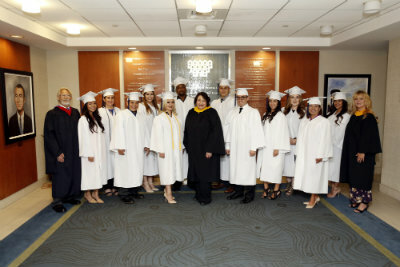
With a Flip of Their Tassels, VN Students Graduate
On Thursday, July 14th, 2016, the Jewish Home’s Annenberg School of Nursing (ASN) celebrated its eighth graduating class of vocational nursing students. The Class of 2016 proudly took the stage in the Grancell Village Activities Center as their families, friends, and co-workers cheered them on.
Graduate Laura Faridi welcomed the audience. “This day seemed so far away when we began. Quiz by quiz, test by test, and final by final (and there were many), the conclusion of our journey is finally here. We’ve built friendships, supported each other through the trials, tribulations and triumphs, and made it to graduation together.” She also extended thanks to the ASN faculty and staff, donors who support the school, and, of course, all the families and friends who helped make the students’ success possible.
Monien Ibarra, Class President, spoke on behalf of the students. “We will continue to be strong advocates for those we will care for and whose lives will be entrusted to us.” She also shared a quote from one of her favorite doctors, Dr. Seuss: “To the world you may be one person; but to that one person you may be the world.”
Valedictorian Lizbeth Lopez expressed thanks to her mother for her support. “While going to school full-time, I also worked a few days each week at the Home. My mother, who worked two jobs, helped out with my four-year-old daughter so I could have the time I needed to study.” Her mother’s support helped Lizbeth earn a gold cord for having the highest grade point average in the class.
Laura Faridi and Cassandra Candia received blue cords signifying perfect attendance throughout the 12-month program. Laura also earned a red cord for the prestigious Florence Nightingale award. The recipient of this award is selected by the class and honors the individual who best exemplified the ideals of nursing: knowledge, integrity, flexibility, strong work ethic, leadership, honesty, and humor. “It’s an honor to be recognized by my classmates,” said Laura. “This says a lot about the relationships we built and how well we worked together as a team.”
After receiving their certificates, the graduates received their class pins and took part in the lamp lighting ceremony in honor of Florence Nightingale. The lamps signify providing comfort and light in a place of darkness and passing the light of knowledge to others; represent the light and enlightenment that comes with knowledge; and affirm the student’s decision to pursue a career in nursing.
Thank you to the dedicated ASN faculty and staff for their commitment to providing excellence in education for their students: Marie Cordeiro, director; Dr. David Cooper, instructor; Barbara Bridges, clinical instructor; Myrna clinical instructor; Barbara Noblet, financial aid coordinator; and Cindy Thomas, admissions coordinator.
The Annenberg School of Nursing will welcome the vocational nurse Class of 2017 with classes beginning this month. Nurse assistant and home health aide programs are ongoing. For more information, please contact Cindy Thomas at (818) 757-4460 or visit the ASN website at www.asn.edu.
Aug
1
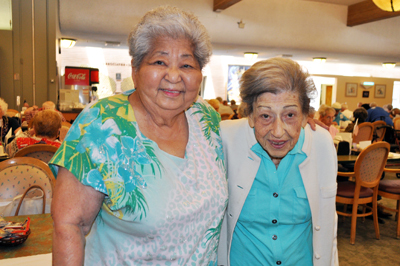
Friendship: A Connection that Lasts a Lifetime
In honor of National Friendship Day, which falls on Sunday, August 7th this year, we celebrate the friendships that enhance the lives of seniors everywhere.
The intimacy of a relationship with a good friend is wonderful enough to bring pleasure to people of all ages. Seniors who maintain close friendships, however, enjoy a world of benefits to their health, happiness and overall well-being.
“For seniors the health benefits of friendships are invaluable,” says Jewish Home Chief Medical Officer Dr. Noah Marco. “When aging adults maintain strong social connections they tend to get more mental and physical stimulation— both are essential for healthy aging. Other physical benefits include lower blood pressure, a boosted immune system, and reduced risk of depression, cognitive decline, and Alzheimer’s disease.”
The Jewish Home's Eisenberg Village residential care social worker Thelma Mata says, “Friendships can improve one’s attitude, behavior, and outlook on life. This type of special connection can also help seniors prevent isolation and depression.”
Seniors in residential care at the Eisenberg Village campus have endless opportunities to gather, interact, and engage with others. Throughout the campus’ living spaces, they can be seen in pairs and groups, enjoying each other’s company.
From enjoying a delicious meal in the dining room to playing an exciting game of Bingo, joining the Book Club to attending a Shabbat service, making jewelry in Arts and Crafts to volunteering in the post office— every moment is a chance to find and foster friendship.
“The Home is the perfect environment for seniors to stay socially engaged,” says residential care activities aide Anna Kocis. “With so many programs, activities and events for our residents to take part in, there are plenty of opportunities to get involved. Once seniors start becoming active in the community, they realize they share common experiences and interests and begin to form lasting friendships. These relationships form the basis of a life-enhancing experience.”
Jewish Home residents Grace Peshkin and Myrtle Feenberg are a perfect example of this. When Grace and Myrtle first moved to Eisenberg Village seven years ago, they knew they were meant to become good friends. “I remember it all so clearly,” says Myrtle. “We moved in around the same time and Grace was one of the first people I ever spoke to.”
“From the very beginning we started spending a lot of time together,” Grace recalls. “It all started when we realized we had so much in common. We both love shopping, sharing, and conversation.”
“It’s been wonderful! We confide in each other, and give one another advice. Sometimes our opinions differ and we argue, but we’re still friends,” says Myrtle. “It’s funny, we’re just like sisters!”
This National Friendship Day, remember the importance of senior friendships. Make the decision to foster the strong, long-lasting relationships that lead to a happier, healthier, and more fulfilling life.
Jul
11
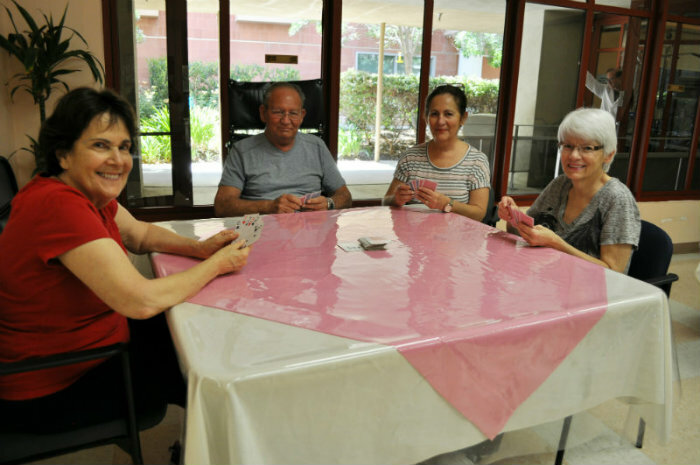
An Unexpected Friendship at the Ida Kayne Transitional Care Unit
From left to right: Kathy, Ernesto, Lourdes, and Francine
You never know where you’ll find a friend.
Short-term rehabilitation patients Kathy, 73; Ernesto, 67; and Francine, 67 experienced the joy and surprise of an unexpected friendship when they stayed at the Ida Kayne Transitional Care Unit (TCU) at the Los Angeles Jewish Home.
Kathy was recovering from a patellofemoral surgery performed on her right knee, Ernesto was recuperating from a ruptured quadriceps tendon, and Francine was on the road to recovery after falling and breaking her hip.
When faced with the challenge of making a fully recovery after an illness, injury, or medical procedure, all three seniors trusted the expert rehabilitative staff and state-of-the-art facilities of the Jewish Home’s TCU program would help to get them back on their feet.
The trio became fast friends when they were assigned to sit at the same table in the dining room of the Taper Building. The threesome's budding friendship blossomed when Ernesto enlisted the help of his wife, Lourdes, to teach Kathleen and Francine a popular card game. The group now spends their afternoons deep in conversation over a few competitive games of Continental Rummy.
The Ida Kayne Transitional Care Unit at the Los Angeles Jewish Home is designed to help seniors successfully transition back home after an illness, injury, medical procedure, or hospital stay. For more information, please call Connections to Care, our toll-free hotline, at (855) 227-3745 or visit our website at https://lajhealth.org/.
Jul
6
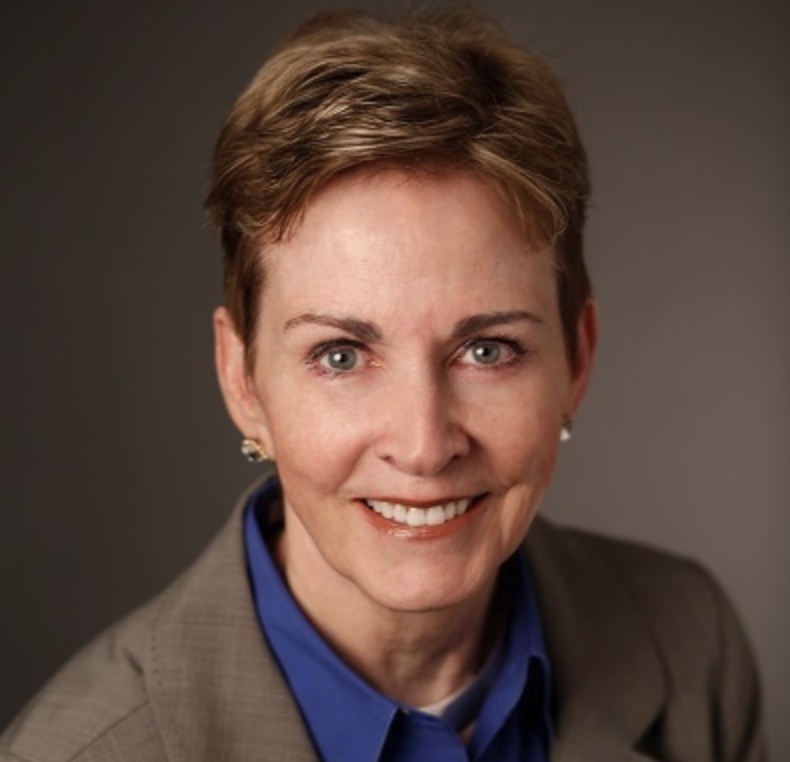
How Can I Ease the Transition to Senior Care?
The transition from a private home or apartment to a senior living facility requires physical, emotional, and, perhaps more importantly, attitudinal adjustments. It also requires generous time to discuss, evaluate, and then make the move.
Experts agree that the key for a successful move is understanding that the change itself can result in an overall better quality of life. It is best to keep in your thoughts and your discussions that the purpose of transitioning to senior care is to enhance their physical, psychological, and social well-being.
The Challenge of Change
Change is difficult at any age. Consider how good it feels to return home, even after an enjoyable vacation. Our first response is usually "it feels so good to be home." That's because our minds and bodies experience new environments as an additional stressor.
New places put new demands on us, requiring us to remember where we are, to learn how to access resources, and to make new plans for how our needs will be met.
Home, by contrast, is easy and familiar, a place where we accomplish our movements by rote — from getting a drink in the middle of the night to finding the TV remote!
The Learning Curve
A new setting can take at least three months — and often twice that — for a senior to "learn." Even with full acceptance that the move to a senior living community is a positive step, the learning curve can be steep. The right preparation can make the move a lot easier.
One helpful approach is to step back and look at the big picture. Consider or discuss all options and emphasize what will be gained rather than lost. Many tremendous benefits are often hidden or overlooked in the pressure wrought by change. The fact is that most seniors gain rather than lose independence.
Transitioning
Rather than embarking on a move abruptly, keep an eye out for opportunities to ease gently into a new situation. Try visiting a new residence during the lunch hour. Have lunch there with your parent (or loved one). An ordinary activity, like dining, can help familiarize you or a loved one to a new environment.
On your next visit, stay a little longer after a meal. Participate in a social activity that appeals to you, whether it's a game of cards or watching a favorite show or movie.
In all interactions with staff, try to be comfortable accepting assistance, and remember they are experienced professionals who are committed to their work.
An Emphasis on New Freedoms
After making a move, seniors sometimes compare their new homes to living on a cruise ship. It's true! You move in, the room is fresh and clean, and the place is yours. Meals and snacks are provided for you around the clock.
You have the opportunity to take a variety of educational, artistic, or recreational classes. Exercise classes or individual workouts can restore or improve health. Spiritual activities and support can provide a new sense of fellowship and well-being. Through social opportunities, new friendships are developed and old friendships rediscovered.
Transportation worries are over, and life opens up in new ways. Seniors are now free to take in a movie or museum, or to go shopping whenever they like. For many who have been struggling to keep up their own homes, it is a tremendous relief to have someone else take care of everything.
In an age when more and more senior living facilities are sensitive to the needs of the whole person, seniors are leading far more enriched lives full of meaningful activities that make each new day an opportunity to enjoy all that life has to offer.
A 40-plus-year veteran of senior housing and healthcare issues, Molly Forrest is the Chief Executive Officer-President of the Los Angeles Jewish Home, one of the foremost multi-level senior living communities in the U.S. and the largest single-source provider of senior housing in Los Angeles.
Jul
1
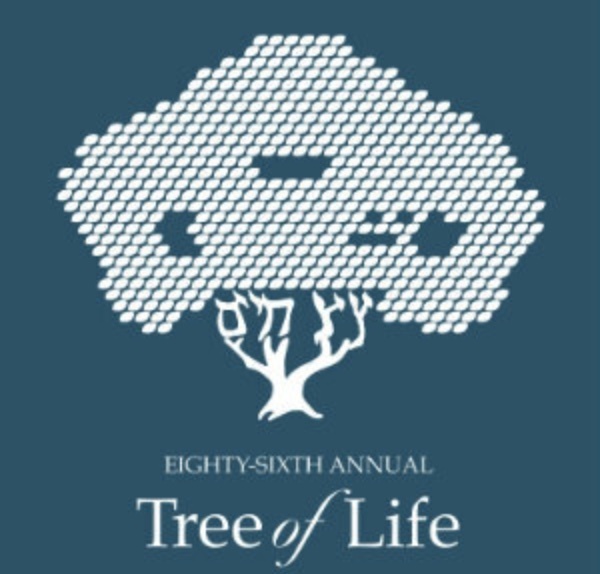
Tree of Life Luncheon Honors Two Longtime Supporters
With summer already here, Associates-IMC is busy planning its 86th Tree of Life Luncheon to be held on Wednesday, August 10, at The Beverly Wilshire Hotel, 9500 Wilshire Boulevard, Beverly Hills. This prominent auxiliary support group of the Los Angeles Jewish Home will be honoring two exceptional individuals whose commitment to the Home and Jewish community is unparalleled. Rosanna Hirshon Bogart will be honored with the Zelda White “Woman of the Year” Achievement Award, and Bob Hirsch will be recognized with this year’s Humanitarian Award.
Rosanna Hirshon Bogart has tirelessly supported the Jewish Home for many years and served as president of Associates-IMC from 2003-2007. She helps provide yearly scholarship funds for the Home’s Annenberg School of Nursing. Rosanna is a member in the Tiffany Society, the Marilyn & Monty Hall Statesman’s Society, the Century Club, and the board of governors. Having gifted the Home with the Rose Garden Wall on the Grancell Village campus in memory of her parents and late husband, Arnold “Bogie” Bogart, Rosanna is an active and supportive executive advisor of the Associates-IMC board of directors. Her community involvement includes her support of the Child and Family Guidance Center, American Technion Society and the L.A. Opera. She sits on the board of The Music Guild and is an active member of the California Retired Teachers Association.
Bob Hirsch has served on the Jewish Home’s building and facilities management committee and as a past chair of the Home’s board of directors, on which he continues to serve. He was on the Home’s executive committee, the building and safety committee, the council of past presidents, and the Annenberg School of Nursing board. Bob is a member of the Marilyn & Monty Hall Statesman’s Society, Century Club, Legacy Circle, the board of governors, and The Executives’ Generation to Generation. He recently donated over two acres of land adjacent to Grancell Village currently being developed as the Hirsch Family Campus. Bob’s extensive community involvement includes being a board member of Alzheimer’s Los Angeles, as well as working with the Skirball Cultural Center, Beit T’Shuvah, the Shoah Foundation, de Toledo High School, and the Jewish Community Foundation.
The Tree of Life Luncheon will begin at 10:00 a.m. with a boutique featuring many diversified vendors. The luncheon will start at 11:45, when Madeleine Rosenberg, president of Associates-IMC, will be welcoming all the attendees. Florence Gorlin, luncheon chair, is looking forward to introducing the special guest speaker, Jeanne Phillips, also known as “Dear Abby,” the world’s most widely syndicated columnist.
The Honorary Luncheon Chair is Renee Kumetz. Honorary chairs include Barbara Miller-Fox Abramoff, Janet and Jake Farber, Marion Goldenfeld, Earl Greinetz, Regina Scheer, and Joan and Arnold Seidel.
Event chairs are Terri Bloomgarden, Joy Brook, Donna Burstyn, Roberta Delevie, Earl Greinetz, Claire Kunin, Diane Miller, Sheila Rose, Nancy Salka, Regina Scheer, Melinda Seltzer, Sandra Stackler, and Gloria Stoddard.
Tree of Life Luncheon tickets are $165 per person, including parking, and are the perfect opportunity to support the Jewish Home and recognize our deserving honorees. The proceeds will bring in much-needed funds to care for the 1,000 on-campus residents besides sustaining 5,000 seniors the Home serves each year through its extraordinary continuum of care.
We welcome your support and hope to see you at the luncheon. For more information, please contact the Associates-IMC office at 818-774-3375 or [email protected].
Jul
1
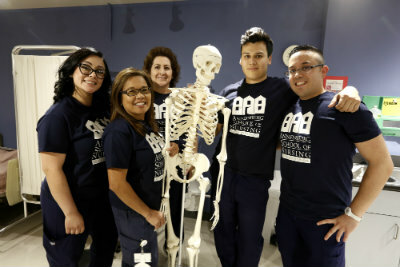
ASN Vocational Nurse Program: A Prescription for Success
The Jewish Home’s Annenberg School of Nursing (ASN) began its vocational nurse program in 2007. The 12-month, full-time program includes classroom and skills lab instruction as well as clinical training at local hospitals and other sites. A vocational nurse, or VN, is trained to administer medication, change dressings, monitor vital sign, and maintain patient charts. The program prepares students for the NCLEX-PN® licensing examination.
ASN is currently accepting applications for the Class of 2017, scheduled to begin in September. Information is available online at www.asn.edu or by attending an Open House event, which will be held on July 19th and August 2nd.
While someone considering a career as a vocational nurse has many schools to choose from, there are some very good reasons to choose ASN. First of all, it’s a program of the non-profit Los Angeles Jewish Home, an organization that has provided excellence in senior healthcare since 1912. The relationship between the Home and ASN is a major reason many students choose ASN for VN, nurse assistant (CNA) and home health aide (HHA) studies.
According to the VN Class of 2016, additional reasons to choose ASN are:
facilities • accreditation • financial aid package • low tuitionfaculty • NCLEX-PN® pass rate • employment resourceexcellent clinical sites • graduation rates • small class size
Alumni of ASN’s VN program agree. “The small class size provided a fantastic experience for me, and faculty and staff were always available to help with anything we needed,” says Joselyn Shmaeff, BSN, MBA, RN. After licensure, the Class of 2011 graduate went on to work as a LVN in skilled nursing at the Home, in pediatric home health and outpatient wound care, and to teach VN students. She completed her Bachelor’s in Nursing and attained her RN license in November 2015. Joselyn now works full-time as a RN in the ICU of Valley Presbyterian Hospital. “I owe the Annenberg School of Nursing everything! They provided me with an excellent foundation in nursing and a great starting point to a career with endless possibilities.”
Class of 2009 graduate Norma DelCid, BSN, RN, also speaks highly of her experience at ASN. “I could not have chosen a better school to start my life – and I say life because nursing is my life.” Now director of health services at the Home’s Fountainview at Eisenberg Village, Norma explains, “The instructors prepared me for the real world of nursing. I am now a BSN, RN, and I still refer back to what I learned at ASN, whether it be documentation, assessment, or bedside manner. The faculty and staff encouraged me to believe in myself and molded me into the nurse I am today.”
ASN director Marie Cordeiro has some thoughts about the Annenberg experience and how it can lead to a successful career in nursing. “Our curriculum is comprehensive – we cover the full journey of life, from birth to death. We offer excellent resources, such as our skills and computer labs.” The skills lab features medical manikins that provide a way for students to practice inserting gastric tubes for feeding, giving injections, and wound care. A special maternity manikin, Coco, allows students to practice delivering babies and providing post-delivery care.
“We’ve also added two clinical sites to our rotation,” adds Marie. “Kaiser Permanente, a medical-surgical hospital, currently provides our students with hands-on experience in their maternal/child clinics. ASN has been approved to utilize all Kaiser clinics as clinical sites in the future. Our students will be rotating through Pacifica Hospital, where they will care for patients in the sub-acute unit. These patients may be on ventilators, have tracheotomies, or have gastric feeding tubes.” At Mission Community Hospital, ASN students work in the out-patient surgery department, where they see a wide variety of procedures, and in ICU. “Our students are exposed to all components of nursing, and have the ability to begin a career in any area of nursing.”
Nursing continues to be a fast-growing field. The Bureau of Labor Statistics states that nursing, and particularly vocational nursing, will grow by 25% by the year 2022. According to Marie, “This is significant. As our baby boomers age, the “oldest of the old” will become the largest segment of our population. They will also be the biggest consumers of healthcare. There are not enough RN schools to fill all the spots that will be needed. And, home health care will continue to grow, which is a natural fit for a VN.”
The field of nursing is one that offers challenges and provides great rewards. If you are considering nursing as a career, consider the Annenberg School of Nursing. For more information, please register to attend an Open House by calling Cindy Thomas at (818) 757-4431 or visiting the ASN website at www.asn.edu.